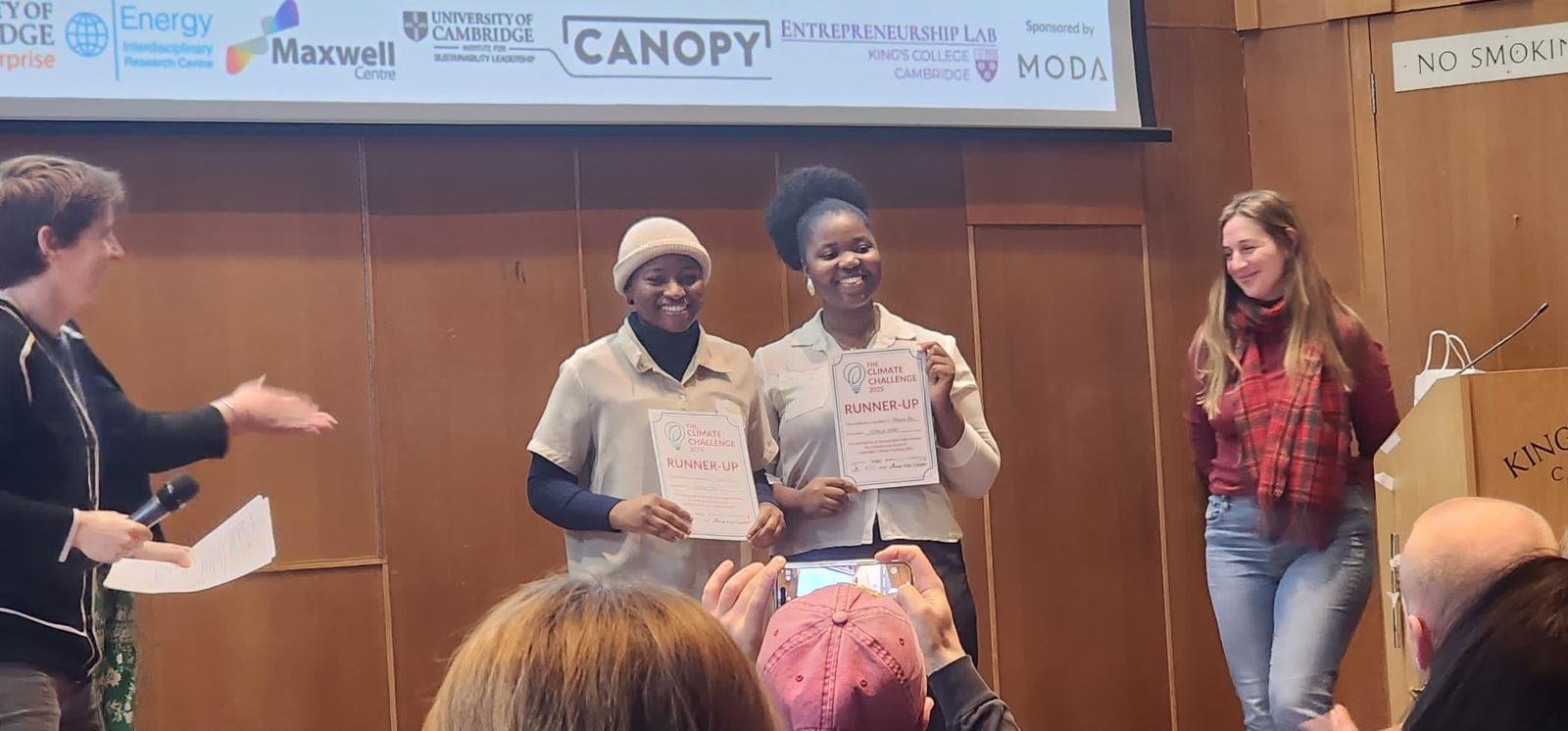Reflection on the Cambridge Zero Climate Challenge: Empowering Women to Solve Water Scarcity
Written by Maureen Abel and Hauwa Busari
What if the water you depended on for survival was contaminated with oil pollutants, industrial waste, and agricultural runoff? This is the harsh reality for many communities in the Niger Delta where we were born and raised. Living in a region ravaged by oil pollution, we have experienced the direct impact of water contamination. This is what ignited our commitment to create sustainable solutions.
Our journey began with the King’s Entrepreneurship Lab (E-Lab) Social Ventures Programme in January 2025. As Mastercard Foundation Scholars, we joined a diverse group of young entrepreneurs dedicated to social change. The E-Lab equipped us with vital knowledge in entrepreneurship, sustainable innovation, and leadership, helping us to develop critical problem-solving skills and to understand the core principles of scaling social ventures for lasting impact.
To build on this foundation, we joined the Cambridge Zero Climate Challenge, a prestigious platform for climate innovators. The programme offered intensive training to further shape our understanding of climate entrepreneurship. Through this, we developed H2O Kline Filters, a sustainable water filtration system that repurposes agricultural waste. Agricultural waste is an abundant but underutilised resource in the Niger Delta.
Expert-led sessions were instrumental in developing H2O Kline Filters into a viable and scalable solution. We engaged in workshops covering crucial topics including effective storytelling, investment strategies, and carbon markets, which enabled us to strategically position our solution, engage stakeholders, and navigate complex funding landscapes. We were able to learn from experts on climate systems and business model which helped us refine our approach and understand our project’s broader impact.
On Friday 21 March 2025, we took centre stage in Keynes Hall at King’s College for the final showcase. Presenting H2O Kline Filters before distinguished judges, climate experts, and investors, we spoke with the authority that comes from firsthand experience of water insecurity. The room was abuzz with anticipation as innovative solutions were shared. When our project was announced as first runner-up, it marked a definitive moment of recognition. This achievement wasn’t merely ceremonial, it was an endorsement that our solution demanded global attention and investment. The expert insights shared by judges and powerful network of connections we made at the event transformed theoretical possibilities into actionable plans.
The transformation of our entrepreneurial mindset through these experiences has cemented our conviction that the combination of innovation, entrepreneurship, and sustainability can effectively address even the most challenging global issues.
As we look toward the future of H2O Kline Filters, we are energised by the opportunity to lead a movement that creates lasting, meaningful change; a solution that gives women and children their time and life back. The robust tools, networks, and skills we have developed have prepared us to scale our solution and deliver clean water to communities where it’s most urgently needed.
As African environmentalist Wangari Maathai powerfully stated, “In the course of history, there comes a time when humanity is called to shift to a new level of consciousness. That time is now”.
Through H2O Kline Filters, we are answering this call, taking decisive action today to create a more sustainable tomorrow.
Maureen Abel and Hauwa Busari
Maureen is an MPhil African Studies student at the University of Cambridge (Magdalene College) and is a scholar of the Mastercard Foundation Scholars Programme. With a background in linguistics and communication, Maureen explores how indigenous knowledge systems can inform sustainability practices and climate resilience. Beyond academia, she is a member of Clearpath Leadership Awareness Network and is passionate about addressing environmental challenges and social inequities, particularly in the Niger Delta region of Nigeria.
Hauwa is an MPhil student at the University of Cambridge, specialising in sustainable architecture and neuroscience to design environments that foster mental health and resilience, particularly for vulnerable communities. Having grown up in Bonny Island, Port Harcourt, and witnessing firsthand the challenges of access to clean water in areas impacted by oil pollution, she is deeply committed to creating climate-resilient, people-centered design solutions that address environmental crises and support the well-being of local populations.

